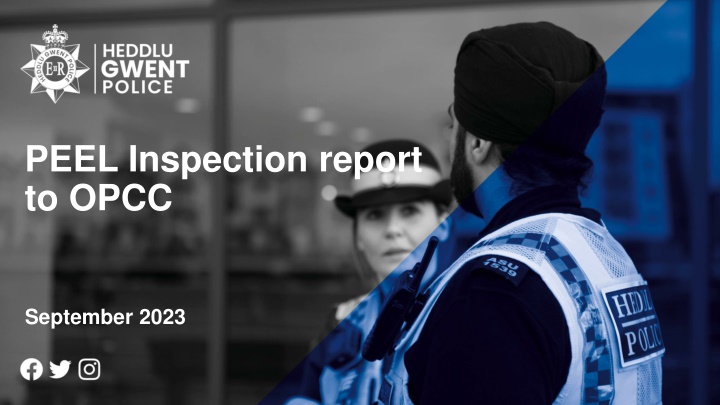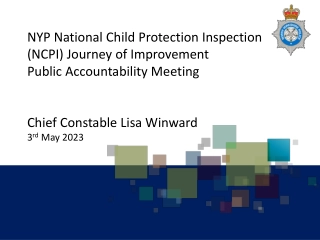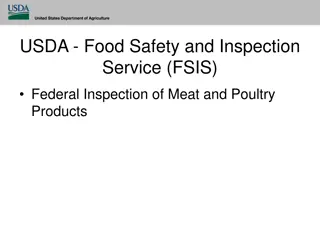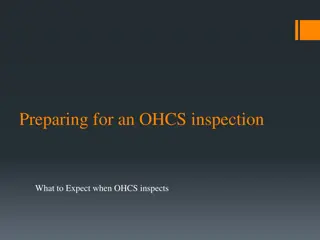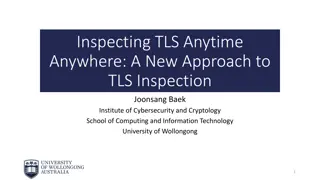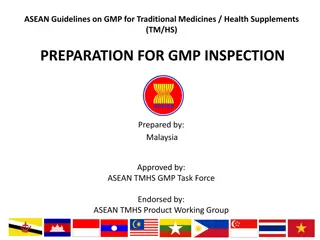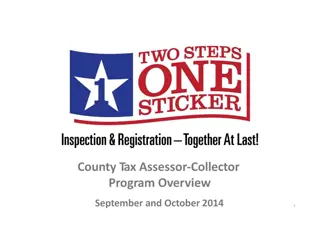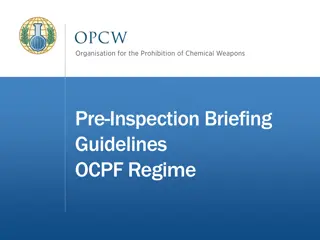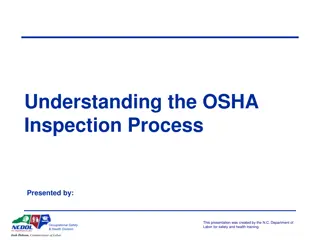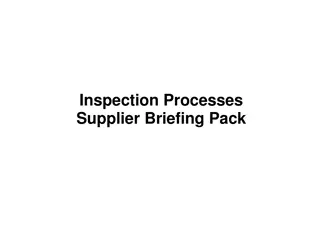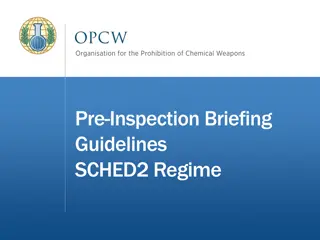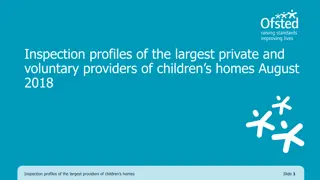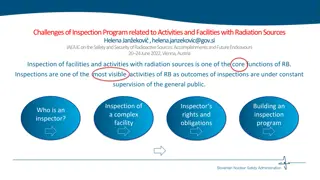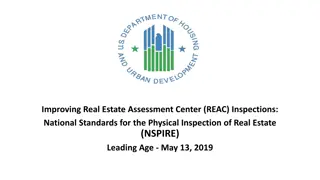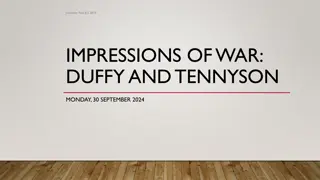Progress Report on PEEL Inspection and HMICFRS Updates
This report summarizes the progress made in addressing areas of concern identified in the PEEL inspection report to OPCC in September 2023. Focus is on responding to the public, improving stop and search recording, meeting national standards for domestic violence disclosure, and enhancing call handling processes at Gwent Police based on HMICFRS recommendations. Updates include implementing structured triage approaches, enhancing call scripts, and improving call response times to better serve victims.
Download Presentation

Please find below an Image/Link to download the presentation.
The content on the website is provided AS IS for your information and personal use only. It may not be sold, licensed, or shared on other websites without obtaining consent from the author.If you encounter any issues during the download, it is possible that the publisher has removed the file from their server.
You are allowed to download the files provided on this website for personal or commercial use, subject to the condition that they are used lawfully. All files are the property of their respective owners.
The content on the website is provided AS IS for your information and personal use only. It may not be sold, licensed, or shared on other websites without obtaining consent from the author.
E N D
Presentation Transcript
PEEL Inspection report to OPCC September 2023
PEEL Report Progress 2023 slide 2 Whilst updates are provided on all areas focus is given to the area identified as Cause for Concern Responding to the Public Whilst action has been identified in order to address other matters it should be noted that challenges are also identified in the following areas - The force should improve its recording of reasonable grounds for stop and search, in compliance with force policy and the authorised professional practice The force needs to improve how effectively it meets national standards in relation to the use of the domestic violence disclosure scheme
Responding to the public Question 4
HMICFRS: Responding to the public updates slide 1 Within three months, Gwent Police should: make sure a structured triage approach is used to assess risk and consider the needs of the victim; 86.4% now utilise a structured triage and call script to assess risk. This links to the below points in terms of identification of vulnerability and repeat callers. Training & briefings have been deliver to all staff, supervisors, FIMs and Silvers on this. New QA process in place. Because of the nature of the incident reported a call script is not always required and dip sampling is utilised where omitted to ensure compliance. make sure that call takers give appropriate advice on the preservation of evidence and crime prevention. Call scripts have been amended to prompt operators to ensure that they give this guidance. A new process has been put into policy, and a new function, enabling operators to send text messages to callers/victims containing advice for victims, crime prevention and CSI has been put into place. This is tested as part of the supervisor QA process which is now firmly embedded in the FCC.
HMICFRS: Responding to the public updates slide 2 Within six months, Gwent Police should: make sure it can answer a greater proportion of non-emergency 101 calls so that caller attrition levels are reduced and kept as low as possible; and 101 Abandonment now sits at 28.2% for financial year 2023/2024 to date (26.5% for July 2023). 36.3% for 2022/2023 thus has reduced. We have seen month-on-month improvements in this area despite significant demand. As a comparative for abandonment rate for July 2022 was 46.9% attend most calls within its published time frames and update victims if there is a delay On the 17th July a new supervision structure has been put into place as well as the VSA weekly meeting to share best practice. The new structure focuses on three key roles 1. Performance and resource manager 2. Initial risk manager 3. Dispatch manager who also focuses on victim updates Improvements to attendance times were evidenced almost immediately and currently sits at Emergency 54.6% from 47.5% Priority 52.8% from 31% Performance in relation to victim updates and dispatch compliance will be tested through the new QA processes
HMICFRS: Responding to the public next steps slide 3 Using the employee opinion survey FCC managers are striving to learn what matters to staff Senior Management team meetings have a weekly SMT focused on each of the following People Quality Assurance Performance FCC Advisory group/ FCC FCC Advisory / Working group meetings per team (volunteer reps) held every 4-6 weeks due to shift pattern
Engaging with and treating the public with fairness and respect Question 2
Engaging with and treating the public with fairness and respect slide 1 The force should improve its recording of reasonable grounds for stop and search, in compliance with force policy and the authorised professional practice The tactical lead is reviewing training material in terms of reasonable grounds. This will be aligned to officer safety training The OPCC and the force tactical lead have carried out benchmarking to widen the make up of scrutiny panels. Horizon scanning is taking place in light of changes to stop & search powers, the force are part of the consultation The force continues to scrutinise stop search cases with OPCC and Independent Advisory Group partners to review the reasonable grounds and the encounter. This recommendation is an area of challenge for us at the moment
Investigating crime Question 5
Investigating crime update slide 1 The force should make sure that it has the capacity and capability to effectively investigate crime on behalf of the public, and that its governance and scrutiny arrangements result in improved standards of investigation The governance and scrutiny arrangements have been reviewed in the recent force governance restructure. Chaired at Chief Officer level. The implementation of the File Management Unit (FMU) has resulted in reduced demand for frontline resources. In the 7 months since the creation of the FMU 30000 hours of frontline time has been saved. Since the inception of the iHub on the 1st June 2023 the team have taken demand from frontline policing. As of the 27th July 200 incidents have been dealt with. The Succession Planning Group TOR has been reviewed and working closely with Human Resources this will now merge with CID/PPU implementation group going forward. Strategic Workforce Planning monitors resources, succession planning and skills for the force at a strategic level. Improvements are being seen in resource numbers across critical areas of PPU. Standards of investigation are monitored through the investigations standards meeting.
Investigating crime update slide 2 The force should make sure investigation plans are created where applicable, with supervisory oversight and direction throughout SU01 is the template utilised to capture supervisory oversight and investigative direction. The force recorded a baseline between April 2022 October 2022 of SU01 compliance that was 87.7%. It is 91.4% as of the 14th August 2023. The Victim Service Assessment Force progression dashboards monitor the compliance and its acknowledged that there are still challenges to overcome. A Rape Tracker has been implemented to ensure continued focus, scrutiny and accountability for rapes held within CID (prior to the establishment of a RASSO Team). Reducing live rape cases from 209 to 114.
Investigating crime update slide 3 The force should make sure investigations are completed without unnecessary delays and that all proportionate and relevant investigative opportunities are taken Investigation lengths tracked through VSA Dashboards and VSA DMM the information can be self served by supervisors and managers Since October 2022 to May 2023 investigation lengths have reduced from 55 to 23 days. Crime reviews have been completed utilising the HMICFRS methodology and have been refreshed to make use of the analytical automation within M365 Investment in Burglary pilot to ensure a quality initial response and immediate support for victims of burglary, improve our standards of investigation and victim satisfaction relating to burglary offences
Investigating crime update slide 4 Where a victim has decided to withdraw support for police action, the force should ensure that there is an auditable record of this decision. This should include the reason why the decision was made. The force should make sure it documents whether evidence-led prosecutions have been considered in all such cases In accordance with HOCR outcome 15 is utilised where a police decision is made to take no further action based on evidential difficulties. We now also use CO15 where the victim has failed to engage but we have no verbal/written retraction statement. The outcome 16 policy now stipulates there must be documentary evidence that a victim is withdrawing their complaint and supporting explanation. Calls scripts have been amended to capture why no formal action is being taken. CO16s are twice weekly audited and compliance is 95%. The use of CO17 outcomes is now reserved due to a change in our force policy for those offences that are statute barred at the time of recording. We no longer use the outcome to finalise occurrences that have gone statute barred due to failed/stalled investigations. Feedback in relation to stalled/failed investigation is managed by LPU supervisors and feedback given to front line officers.
Protecting vulnerable people Question 6
Protecting vulnerable people slide 1 The force should make sure that its governance and scrutiny arrangements provide enough capacity and capability to effectively protect vulnerable people A review of governance structures and arrangements has been conducted The vulnerability meeting, covers all workstreams from FPOC through to NPT, Response, CID, PPU and custody. This ensures that there is oversight, scrutiny and accountability around forces responses to vulnerability. Regular engagement with National Vulnerability Knowledge and Professional Practice Programme is embedded Improvements have been implemented to Human Resources Establishment systems to effectively align staff and succession planning to future proof public protection teams and other areas to protect the vulnerable.
Protecting vulnerable people slide 2 The force needs to improve how effectively it meets national standards in relation to the use of the domestic violence disclosure scheme Following a review by Business Change, staffing has increased by two staff members from 31st July 2023 to improve how we effectively manage demand. Processes have been streamlined to make the DVDS system more efficient and new ways of working have been explored to expedite disclosure delivery such as Good Sam. Bench marking with other forces has taken place and processes are being reviewed given that the HMICFRS identified that Gwent Police provide disclosures wider than directed in the guidance. The force continues to review open cases to ensure we understand risks and timescales to ensure compliance with national standards. The force acknowledges there are significant challenges in this area.
Protecting vulnerable people slide 3 The force should make sure it appropriately manages MARAC demand to reduce the risk of serious harm to high-risk victims of domestic abuse The force understands that Safelives guidance figures are 10years old so we are working with communities and partners to improve reporting of domestic abuse To reduce inappropriate referrals a Multi-agency Triage Panel are in place that seek to ensure the correct pathways to MARAC. MATAC meetings to look at disruptions and diversions with a multi-agency approach to reduce offending and protect victims. The force is working with the VAWDASV Commissioning Board to look at a sustainable partnership model for MARAC and future proofing the structure
Building, supporting and protecting the workforce Question 11
Building, supporting and protecting the workforce slide 1 Gwent Police should demonstrate that it can use its understanding of factors contributing to sickness and absence to improve the well-being of the workforce The force has invested in the development of a live time Qlik application to ensure it understands sickness and absence rates. Mental Health, Musculoskeletal and digestive are the top three reasons for sickness currently. The biggest contributing factors to this at present are vacancy gaps putting pressures on workload demand, the manager to team member ratios and insufficient time dedicated to good quality 121s to ensure individuals feel supported whilst we work through filling the gaps HR are supporting attendance support meetings to improve consistency across supervision and management, and HRBPs are delivering inputs at courses being run such as Introduction to management .
Strategic planning, organisational management and value for money Question 12
Strategic planning, organisational management and value for money slide 1 The force should make sure it has an effective strategic planning framework to tackle important issues We continue to build on our plans and structures that reflect the community s needs and our priorities with effective strategic planning. For example, our priorities reflect in our inspection preparation work (PEEL Assessment Framework), and force delivery plans. We have recently reviewed and redesigned the governance structure consulting key stakeholders. Terms of reference have been developed, and a review of each meeting and board has taken place to ensure the right roles and departments are attending Business planning cycle audits have began looking at Vulnerability and Neighbourhood policing. These will feed back into Business change and Force Management Statement so the force knows its challenges and has focussed plans to address them. Performance tools continued to be a focus through governance arrangements as we continue to improve our standards of investigations, call handling and incident attendance, identified in this inspection report. From September, reviewing the key findings of the HMICFRS Spotlight report against performance products to further enhance their effectiveness.
Strategic planning, organisational management and value for money slide 2 The force should make sure it can effectively manage current demand, with the resources available to it We acknowledge the financial pressures facing policing therefore Services improvement processes and operational process continue to be refined at strategic and tactical levels to ensure value for money With an embedded Business Change team who run demand modelling reviews of business areas, we currently have a comprehensive programme of reviews ongoing, examples are operating model, Neighbourhood policing, CID/ PPU, PSD, Justice Administration, FCC, L&D and People Services Force management statement planning is now threaded through the business planning cycle to ensure risks, issues and gaps are identified and planned for. Internal audits quarterly process results will feed into the planning cycle. We have invested heavily in technology in recent years in a bid to make the organisation more effective and efficient. Example is the use Microsoft software to gather information from staff where it is automatically analysed streamlining what were previously manual approaches.
